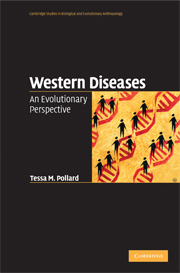Book contents
- Frontmatter
- Contents
- Preface
- 1 Introduction
- 2 An evolutionary history of human disease
- 3 Obesity, type 2 diabetes and cardiovascular disease
- 4 The thrifty genotype versus thrifty phenotype debate: efforts to explain between population variation in rates of type 2 diabetes and cardiovascular disease
- 5 Reproductive cancers
- 6 Reproductive function, breastfeeding and the menopause
- 7 Asthma and allergic disease
- 8 Depression and stress
- 9 Conclusion
- References
- Index
1 - Introduction
Published online by Cambridge University Press: 05 June 2012
- Frontmatter
- Contents
- Preface
- 1 Introduction
- 2 An evolutionary history of human disease
- 3 Obesity, type 2 diabetes and cardiovascular disease
- 4 The thrifty genotype versus thrifty phenotype debate: efforts to explain between population variation in rates of type 2 diabetes and cardiovascular disease
- 5 Reproductive cancers
- 6 Reproductive function, breastfeeding and the menopause
- 7 Asthma and allergic disease
- 8 Depression and stress
- 9 Conclusion
- References
- Index
Summary
This book sets out to examine why certain non-communicable diseases have become common, first in affluent western populations and now, increasingly, worldwide. I use an evolutionary perspective because of its value in showing us why and how human bodies are vulnerable to these diseases. In this chapter I introduce the concept of western diseases and outline the evolutionary perspective applied throughout the book.
Western diseases
In the 1960s and 1970s concerns developed about the rise of diseases such as coronary heart disease, type 2 diabetes and colon and breast cancer as important causes of mortality and morbidity in the western world (Cleave et al. 1969; Boyden 1970; Burkitt 1973). The origins of the term western diseases, and of the approach I adopt in this book, lie in this work. The diseases identified were linked to ‘modern western civilisation’ and were considered to be ‘man-made’ (Trowell and Burkitt 1981a). Specifically, the rise of western diseases was blamed on increased availability of food (accompanied by a decline in the consumption of dietary fibre) and a reduction in physical activity. These authors also acknowledged the impact of an increase in life expectancy, which led to a higher proportion of susceptible older people in the population. The emergence of western diseases in non-western societies, for example in the Far East and in Africa, was linked to the process of westernisation, that is, the adoption of elements of the modern western lifestyle in other areas of the world (Trowell and Burkitt 1981b), a simplistic but nevertheless helpful concept.
- Type
- Chapter
- Information
- Western DiseasesAn Evolutionary Perspective, pp. 1 - 8Publisher: Cambridge University PressPrint publication year: 2008

